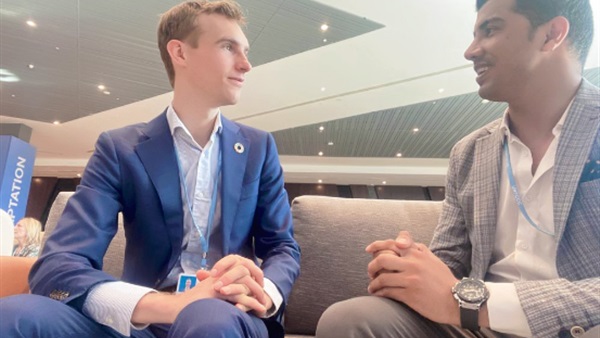Global solidarity... losses and damage of climate change threatens the entire global community

Africa produces only 6% of global emissions, but it is bearing the brunt of the suffering caused by climate change.
COP27 is held in Sharm el-Sheikh, known as the city of
peace, at a time when the world faces many challenges induced by climate change.
This change threatens the entire global community. The
climate summit in Sharm brings together guests from several countries and
representatives of many climate-related institutions.
The past eight years witnessed climate disruption, leading
to a significant increase in the scale of natural disasters. Current climate
policies will condemn the world to a catastrophic rise in temperatures by 2.8
degrees by the end of the century. Collective action must be taken to reduce
this rise to 1.5 degrees. However, greenhouse gas emissions are still rising.
Among those attending the summit is Marie Francoise, the World Bank (WB) country director for
South Africa, Botswana, Namibia, Lesotho and Eswatini.
Attending also is Max van duursen, a PhD researcher in international climate policy at Wageningen
University and Research.
Al-Bawaba News interviewed both guests on the margins of the summit.
Organizing COP27 in Egypt and Africa, Francoise said, makes
it an African conference par excellence.
"I was surprised by the great awareness that I
see across the continent," she said.
Duursen called for global solidarity so that developing
countries can make the transition to the green economy.
There must be, he said, climate finance to help them
do so.
Here is the interview al-Bawaba News
conducted with both summit guests:
Max van duursen
What is the importance of this
year's climate change summit?
There are two distinctive factors at this summit,
firstly: ongoing discussions on loss and damage, which developing countries
have been trying to put on the agenda of dialogues several times in the light
of the resistance of rich countries. It remains to be seen what the outcome of
the delegations' discussions on this matter will be. The second thing that is
special at this summit is the discussions of the delegations on the new
adaptation programmes and the ambitions related to them. This is something that
is very important, especially in the coming decades.
How do you see the Egyptian
organization of the summit?
Regarding the organization of this event, I think it
is a big challenge for all countries to cope with the organization of a
conference attended by all these people. The number of participants is so large.
Despite being an observer, I was unable to attend one of the sessions today due
to the limited space and the large number of attendees.
What are the proposed solutions
to solve the problem of climate change?
I think the solutions offered to deal with climate
change are being discussed at the roundtables now. We should all unite on the
goal of keeping global warming low, specifically curbing the temperature
increase of 1.5 degrees.
Going green and implementing
sustainable development needs some mechanisms to succeed and continue. In your
view, what factors do we need in this file?
With regard to the transition to clean green energy
and sustainable development, one of the most important things we need is global
solidarity. In order for developing countries to be able to make this
transition, there must be climate finance.
It is known that this summit is
called the implementation summit. Will we see resolutions obliging major
industrialized countries to support climate change financing?
The implementation summit needs something important,
which, as we said, is financing. I hope we can achieve this at this summit. As
for how this will happen, I believe that developed countries should take the
initiative and shoulder their responsibility through political decisions at the
highest levels to formulate appropriate ways and means of financing.
Do you think that the meeting of
heads of state during COP27 will bear fruit?
Regarding the heads of state here at the summit, it is
regrettable that many influential figures, such as the Chinese president and
the Indian president, who are two of the major countries, did not attend. I
think it is necessary for the heads of state to attend here because, as I said,
those summits need political decisions for their success, so it is necessary
for the heads of state to be here.
What is your last message to all
participants of this event?
My final message to those attending the summit is to
closely monitor what is happening and increase pressure on their governments to
take action to confront climate change. Climate change directly affects
developing countries, food and energy. Countries must support each other to
combat climate change, address it and mitigate its severity. Many countries
suffer from natural environmental disasters, especially fires, floods and
droughts. We must join hands and work to reduce losses and damage.







